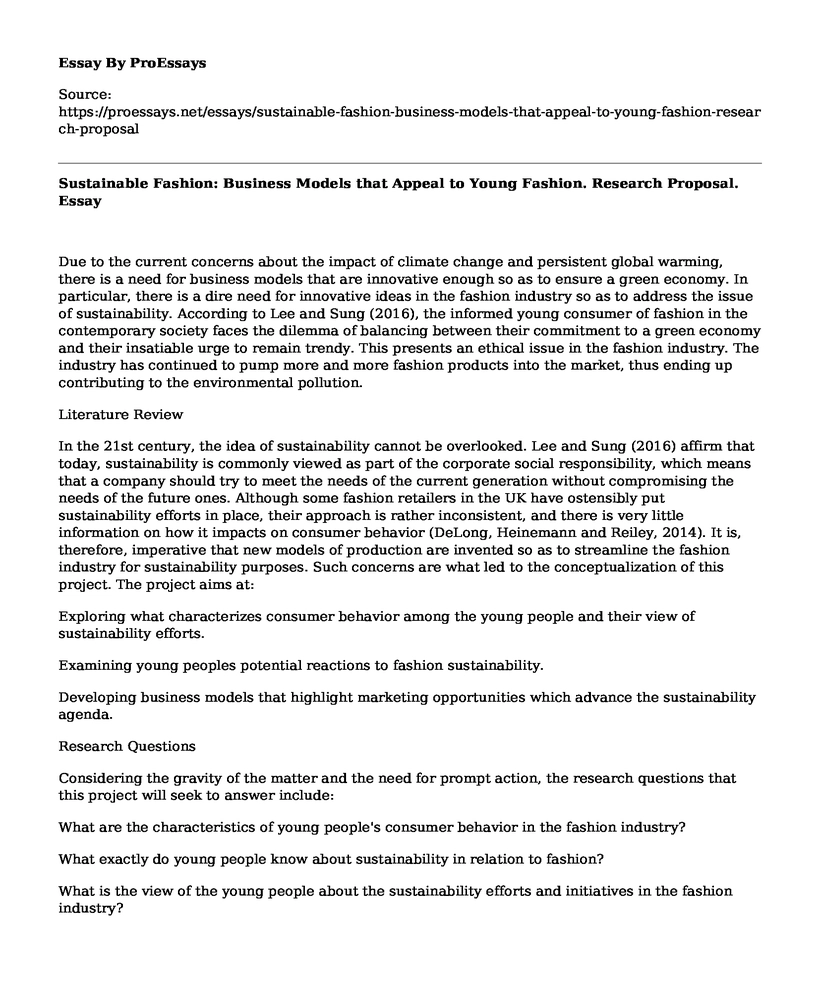Due to the current concerns about the impact of climate change and persistent global warming, there is a need for business models that are innovative enough so as to ensure a green economy. In particular, there is a dire need for innovative ideas in the fashion industry so as to address the issue of sustainability. According to Lee and Sung (2016), the informed young consumer of fashion in the contemporary society faces the dilemma of balancing between their commitment to a green economy and their insatiable urge to remain trendy. This presents an ethical issue in the fashion industry. The industry has continued to pump more and more fashion products into the market, thus ending up contributing to the environmental pollution.
Literature Review
In the 21st century, the idea of sustainability cannot be overlooked. Lee and Sung (2016) affirm that today, sustainability is commonly viewed as part of the corporate social responsibility, which means that a company should try to meet the needs of the current generation without compromising the needs of the future ones. Although some fashion retailers in the UK have ostensibly put sustainability efforts in place, their approach is rather inconsistent, and there is very little information on how it impacts on consumer behavior (DeLong, Heinemann and Reiley, 2014). It is, therefore, imperative that new models of production are invented so as to streamline the fashion industry for sustainability purposes. Such concerns are what led to the conceptualization of this project. The project aims at:
Exploring what characterizes consumer behavior among the young people and their view of sustainability efforts.
Examining young peoples potential reactions to fashion sustainability.
Developing business models that highlight marketing opportunities which advance the sustainability agenda.
Research Questions
Considering the gravity of the matter and the need for prompt action, the research questions that this project will seek to answer include:
What are the characteristics of young people's consumer behavior in the fashion industry?
What exactly do young people know about sustainability in relation to fashion?
What is the view of the young people about the sustainability efforts and initiatives in the fashion industry?
Which business models can best advance the sustainability agenda in the fashion industry?
Theoretical Framework
Many theories have been put forward to explain the social, personal, and cultural aspects that influence consumer behavior in the fashion industry. In the 21st century, fashion sustainability has elicited a lot of research and theoretical aspects in marketing, cultural studies, and social sciences. Earlier fashion theorists viewed fashion as a yearning for social differentiation and inclusion; thus, most of them concentrated on the trickle-down fashion process in the clothing industry (DeLong, Heinemann and Reiley, 2014). However, in the contemporary society, fashion also includes digital devices, automobiles, housing, furniture, music, among others. Lee and Sung (2016) describe fashion as the dimension of current culture which is non-material. Therefore, modern theories of fashion have offered frameworks that support the integration of technology, identity, creativity, and aesthetics. The key themes in these theories of fashion include originality, exclusivity, and newness. Nevertheless, little is said about sustainability about the fashion industry.
Research Methodology
This research will adopt the qualitative research methods. Informal interviews will be conducted with thirty-three young people, aged between eighteen and thirty-five. The sampling will be based on gender, age, and current occupation. Questionnaires will also be issued to another group of thirteen participants selected using the same criteria. Additionally, formal interviews and questionnaires will be applied on seven fashion retailers and three fashion manufacturers. All questions in the interviews will be open-ended while those in the questionnaires will comprise both closed and open-ended questions. To get results that are not only objective but also comprehensive, both primary and secondary data will be collected. The primary data from the interviews and questionnaires will be recorded and analyzed as appropriate to get interesting themes and patterns. Affinity diagramming will be used to create categories that can be used to form a pyramid of ideas. Ethical issues will have been considered already. The secondary data will be collected from library records and websites that have information on sustainability in the fashion industry, reviewed and analyzed systematically. The sampling for the secondary data will be based on the keywords: fashion, young people, and sustainability. It will also be limited to materials that are not older than ten years for purposes of relevance in the contemporary society since the focus is on the current generation of young people.
Conclusion
The idea of coming up with business models of fashion that appeal to the young is no longer an option. This is because sustainability is a priority that has to inform every manufacturer, retailer and consumer of fashion. It would be unfair to destroy the prospects of future generations in the name of fashion. This project will be very instrumental in not only divulging information about the sustainability issue in the current fashion industry but also developing business models that highlight marketing opportunities which advance the sustainability agenda.
References
DeLong, M., Heinemann, B. and Reiley, K. 2014. Redefining, Redesigning Fashion: Designs for Sustainability. Fashion Practice: The Journal of Design, Creative Process & the Fashion, 6(1), pp.125-130.
Lee, M. and Sung, J. 2016. Sustainability and management in fashion, design, and culture. Journal of Global Fashion Marketing, 7(2), pp.73-75.
Cite this page
Sustainable Fashion: Business Models that Appeal to Young Fashion. Research Proposal.. (2021, Apr 26). Retrieved from https://proessays.net/essays/sustainable-fashion-business-models-that-appeal-to-young-fashion-research-proposal
If you are the original author of this essay and no longer wish to have it published on the ProEssays website, please click below to request its removal:
- Rhetorical Analysis of Titanic Movie
- Photography: Final Module Self Evaluation
- Assignmet Example on Social Media
- The Haiti Earthquake Case Study
- Monologue of Olive's "Little Miss Sunshine"
- Essay on Connection Between Culture, Subculture, & Film: Exploring the Relationship
- Essay Example on Analyzing Space in Interior Design: How to Make the Most of It







